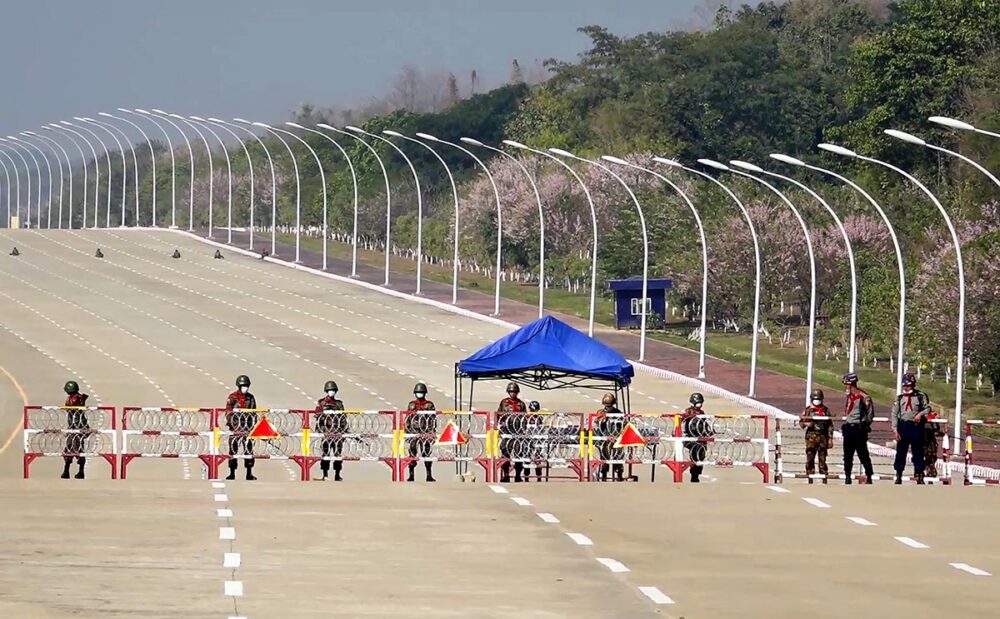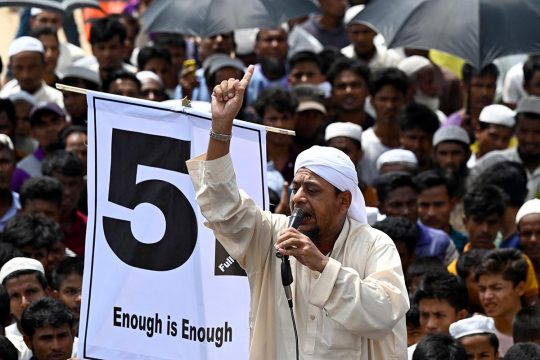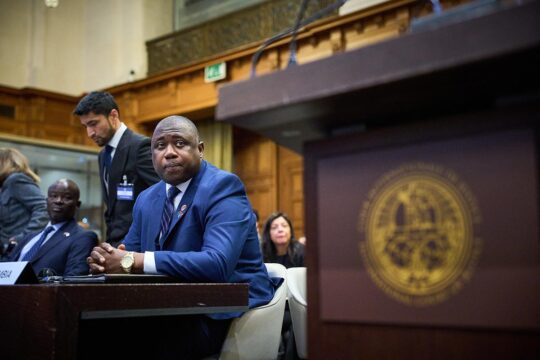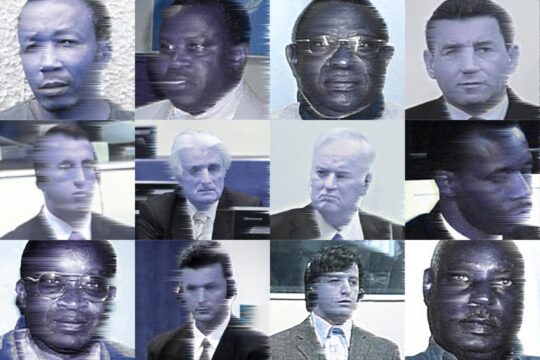The third anniversary of the military coup in Myanmar comes as insurgents are making significant gains on the ground. On January 5, an alliance of three ethnic armed groups known as the Brotherhood Alliance took the important regional capital of Laukkai in northern Shan state near the Chinese border. Thousands of soldiers and officers of the Burmese army surrendered.
“This has resulted in the most significant battlefield defeats that the military has suffered for decades,” says Thomas Kean, Myanmar and Bangladesh consultant for the International Crisis Group and former editor of Frontier Myanmar. “As it stands now, the military has lost much of Shan state to these groups and also significant parts of the Rakhine theatre.” The ethnic armed groups had been biding their time waiting for the right time to strike, he says.
The military who surrendered were released under a deal Kean says was probably negotiated by China. Six generals were returned. Three of them were sentenced to death, and the other three given life sentences -- for giving up the fight, not for any crimes against civilians. There is no one currently in custody in Myanmar or elsewhere for international crimes in the country.
Slow international justice
Several international justice initiatives are under way for Myanmar. At the International Court of Justice (ICJ), there is a case against the State, while the International Criminal Court (ICC) and a national court in Argentina have launched criminal investigations against individuals. The ICJ and Argentine cases are for alleged genocide, while the ICC case is for deportation as a crime against humanity. All concern crimes against the Rohingya.
The United Nations has also set up an evidence-gathering body in Geneva, the Independent Investigative Mechanism for Myanmar (IIMM), with a mandate to “collect, preserve and analyze evidence, and prepare case files to share with relevant national, regional or international courts”. Originally set up to investigate crimes against the Rohingya, its mandate was extended after the coup to include new international crimes committed inside Myanmar.
All these jurisdictions have been slow, as IIMM deputy head Kaoru Okuizumi acknowledges. “International justice is just a long-term effort,” she told Justice Info. “That is our key message when we engage with civil society.”
In September 2018, the ICC authorized its prosecutor to open a case into the Bangladesh/Myanmar situation, but investigations only started in November 2019. There are no visible results so far, and it is unclear if arrest warrants will be issued. “Since taking up his position in June 2021, ICC Prosecutor Karim Khan has sought to accelerate action in relation to this situation, including by increasing field presence of the dedicated investigation team,” his press office told Justice Info when asked about progress. “Since gaining access to the refugee camps in Cox’s Bazar in early 2022, the [investigation] team has made significant progress in moving forward with interviews of Rohingya victims/survivors.” When asked for specifics on the team and their visits to the camps, the prosecution press office said it could not give further details “for reasons of confidentiality”.
In November 2019, Gambia filed a case before the ICJ. The small West African country accuses Myanmar of violating the Genocide Convention in its attacks on the Rohingya minority, particularly during military operations in 2016 and 2017 that led to a mass exodus of this mainly Muslim population to neighbouring Bangladesh. In July 2022, almost three years later, the court ruled that it had competence to judge the case. Gambia has until May 16 this year to submit its last filing, while Myanmar has until December 16, according to an ICJ order. This means no judgment on the merits can be expected until at least 2025.
Argentina could move faster
Opened in November 2021 under the principle of universal jurisdiction, the case in Argentina could produce arrest warrants sooner, according to lawyer Tomás Ojea Quintana, a former UN Special Rapporteur on Myanmar who is now representing victims and complainants in this case. On December 6, 2023, the Burmese Rohingya Organisation UK (BROUK) asked the court to issue arrest warrants for seven Myanmar officials, including current military ruler Min Aung Hlaing, who it says are “responsible for the genocide against the Rohingya people”. The six other people named in this request are “four individuals in the chain of command and two direct perpetrators”, according to Ojea Quintana.
BROUK is one of the parties he represents. Argentine law interprets universal jurisdiction more widely than most countries (including the UK, where BROUK is based), and does not require perpetrators or victims to be on its territory, he explains. It also provides for civil parties to have private prosecutors (Ojea Quintana in this case) who enjoy certain privileges such as being able to propose measures and attend hearings.
The court has not yet made any decision on the arrest warrants and is currently considering information sent by the IIMM, according to the lawyer. He believes the evidence is enough to issue these warrants. It includes testimonies from seven Rohingya survivors who traveled to Buenos Aires to testify in court in June 2023.
“We want prompt results,” Ojea Quintana tells Justice Info. But if arrest warrants are issued, the next challenge will be to get them implemented. Argentine law does not allow for trials in absentia.
IIMM “analytical products”
The IIMM has been working for more than four years, with an annual budget of some $15 million including donor funding. According to its last annual report, it has “collected millions of information items, and engaged with over 700 sources and information providers”. It has shared information with the parties in the ICJ case (Gambia and also Myanmar before the 2021 coup, after which the regime did not respond regarding conditions), as well as the Argentine court.
But what kind of information has it been gathering and sharing? “It’s definitely a priority to establish chains of command and those at senior level who are the most responsible,” says deputy IIMM head Okuizumi. “We have identified individuals. We have not made any of those public, and the case files are under development.”
She says the information shared with the ICJ parties, ICC and Argentine court includes raw evidence, such as social media posts and witness statements, and “analytical products”, including three reports that have recently been shared: hate speech against the Rohingya; Myanmar’s failure to investigate and prosecute sexual crimes; and command structures. Establishing command structures is a challenge, says Okuizumi, especially since Myanmar authorities continue to ignore IIMM requests for access to the country. “So we rely on insider witnesses, or others who have knowledge of command structures and of those in positions of responsibility who may have given orders or were in a position to take action against crimes ongoing.”
Okuizumi says the IIMM has insider witnesses in a number of countries, including many neighbouring countries. Ensuring their security is a priority, she stresses.
Asked if the IIMM information shared with the Argentine court was useful, Ojea Quintana says some was, while some was less useful. “What I can say is that some of the information submitted by the IIMM we used in our request for arrest warrants,” he told Justice Info.
Justice prospects now
With the unpopular Myanmar military regime facing unprecedented losses on the battlefield and more difficulties recruiting, could prospects for justice be improving? Okuizumi hopes a weakening of the military regime could mean more people coming forward with information, as happened after the coup.
“The military are losing control to a range of different groups and organisations, mostly ethnic armed groups, and they will all have different perspectives on the justice issue,” says Kean of ICG. “This is not a conflict between two actors, many are involved. Ethnic groups that have acquired territory apply the death sentence and carry out executions. It’s very complicated.”
In the meantime, “there is no prospect of accountability being possible in courts controlled by the military,” he told Justice Info, “so pursuing justice in international courts is the only realistic option. I think it’s important, and particularly the work the IIMM is doing in gathering evidence, so that at least we know what has happened and we have a record of it.”
Ojea Quintana agrees. “I think it is very important to keep accountability on the agenda,” he says. “You should have been here [last June, in Argentina] when Rohingya women who were gang raped came to testify. It is very important for the Rohingya.”








